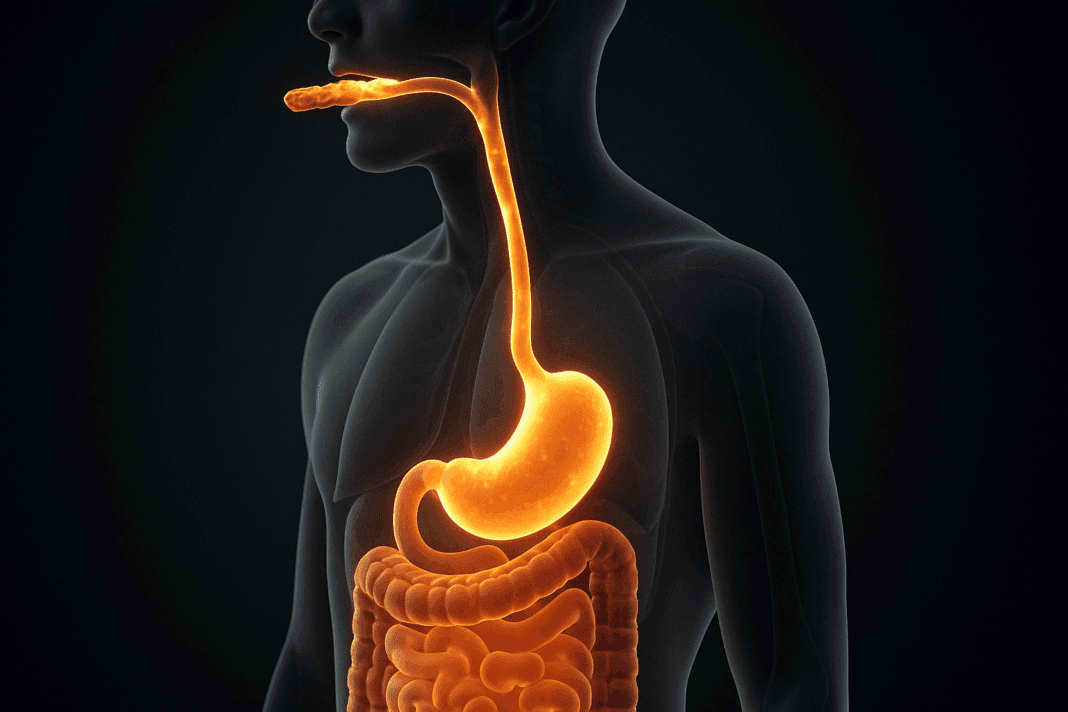Introduction: The Hidden Clockwork of Digestion
Every bite we take sets into motion a finely tuned biological process that fuels our bodies and sustains life. Digestion is not simply about breaking down food; it’s a multi-phase operation involving mechanical and chemical transformations, microbiological interactions, and hormonal signals. Despite how ordinary eating feels, the question “how long does it take for food to digest” opens a window into one of the most sophisticated systems in human physiology. From the moment you chew your food to the point it exits your body, every phase of digestion is influenced by what you eat, how you live, and even your mental state. Understanding digestion speed, stomach emptying, and gut transit can help optimize health, manage gastrointestinal issues, and support better nutrition.
You may also like: Macronutrients vs Micronutrients: What the Simple Definition of Macronutrients Reveals About Your Diet and Health
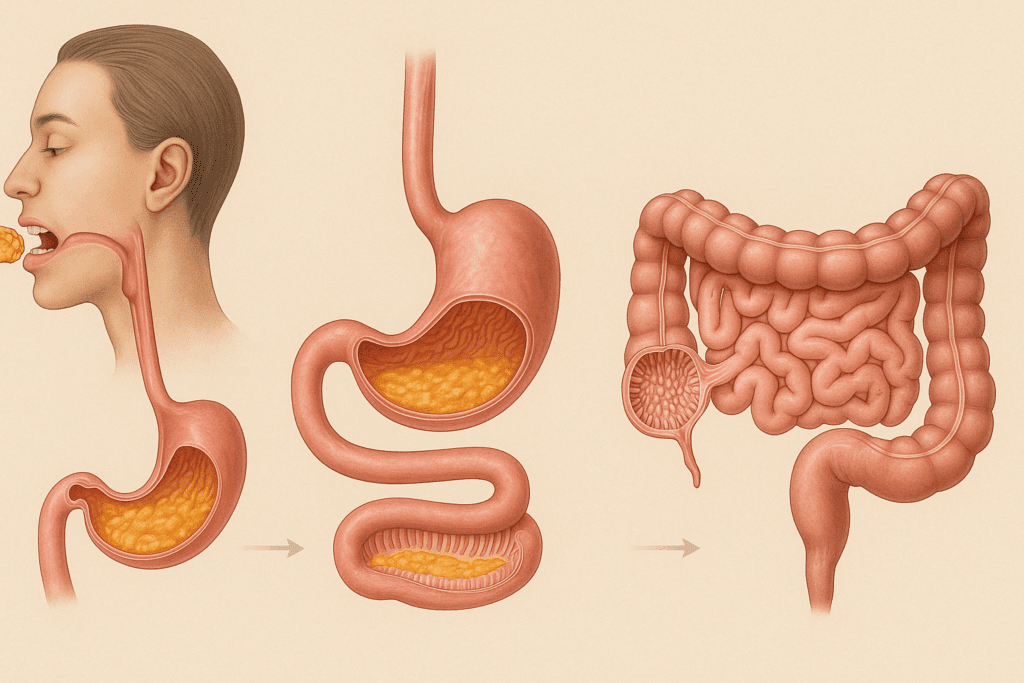
The Digestive Process: A Journey Through the GI Tract
To fully grasp how long digestion takes, we must follow the path food travels through the gastrointestinal (GI) tract. The digestive journey starts in the mouth, where mechanical chewing combines with enzymatic saliva to initiate carbohydrate digestion. Once swallowed, food moves down the esophagus into the stomach, where gastric juices begin breaking it down further—especially proteins. This stage can last anywhere from 2 to 4 hours depending on the type and quantity of food.
Next, partially digested food enters the small intestine, the central site for nutrient absorption. Here, it mixes with bile from the liver and enzymes from the pancreas, breaking down fats, proteins, and carbohydrates into usable molecules. This small intestinal phase lasts about 4 to 6 hours. Finally, indigestible matter moves into the large intestine, where water and electrolytes are absorbed. Waste can remain in the colon for 12 to 48 hours before being excreted. All in all, the entire process of digestion can take anywhere from 24 to 72 hours in total.
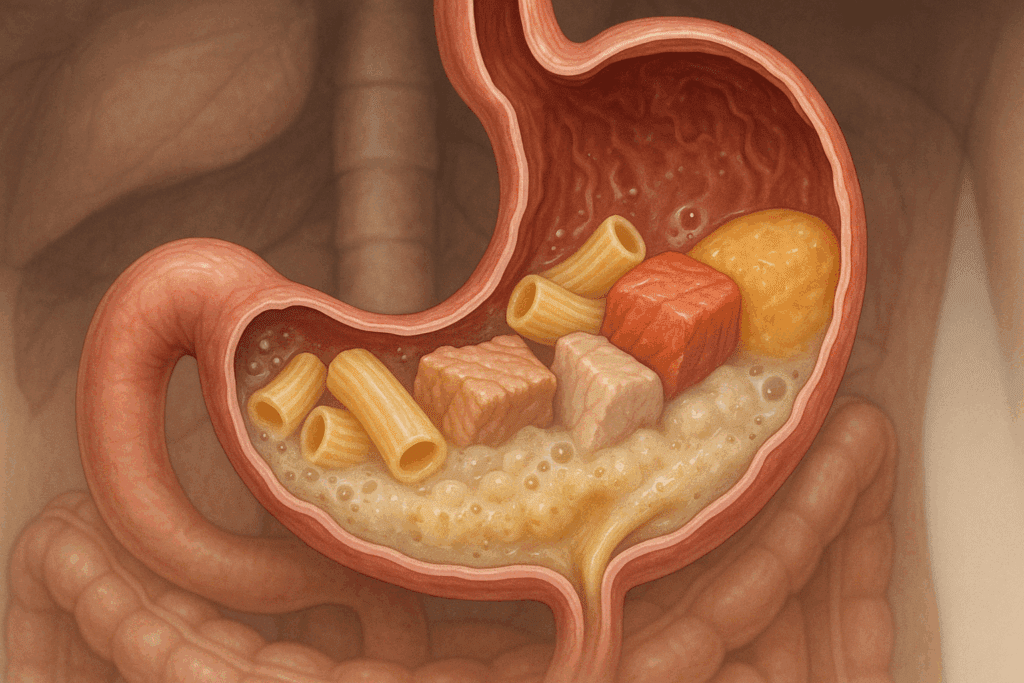
How Long Does Food Stay in Your Stomach?
One of the most common questions about digestion is: how long does food stay in your stomach? The stomach plays a pivotal role, acting as a temporary reservoir where food is churned, mixed with acids, and gradually released into the small intestine. For most people, food remains in the stomach for 2 to 4 hours. However, this timeframe can vary based on food composition. Carbohydrates generally digest the quickest, followed by proteins, and fats take the longest to leave the stomach.
How long food stays in the stomach can affect everything from energy levels to glycemic response. Meals high in protein or fat will slow gastric emptying, leading to prolonged satiety but also delaying nutrient absorption. Conversely, rapidly digestible foods may result in quick energy surges followed by crashes. Understanding how long food remains in your stomach helps individuals choose meals that support blood sugar control, athletic performance, and digestive comfort.
What Influences How Long Digestion Takes?
If you’ve ever wondered why some meals seem to pass quickly while others leave you feeling full for hours, you’re not alone. Many variables influence how long digestion takes. First and foremost is the composition of your meal. Simple sugars can be digested in as little as 30 to 60 minutes, whereas a fatty, multi-course dinner may take up to 6 hours to leave the stomach alone.
Hydration status also matters. Water helps break down food and moves it efficiently through the digestive tract. Physical activity plays a crucial role; regular movement stimulates peristalsis—the rhythmic contractions that propel food forward. Psychological factors like stress and anxiety can either slow digestion (by diverting blood flow away from the gut) or accelerate it in cases of stress-induced diarrhea. The question “how long does digestion take” doesn’t have a single answer—it’s influenced by everything from your fiber intake to your sleep patterns.
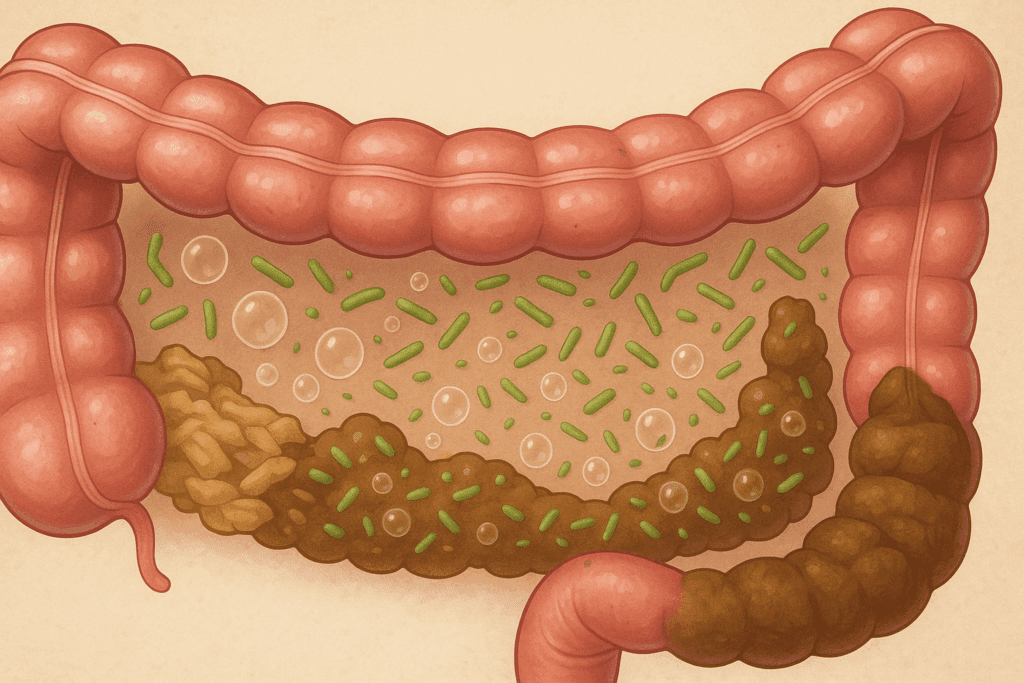
How Long Does It Take for Food to Become Poop?
While it may sound crass, this is actually a medically relevant question. The conversion of food into stool—a process involving extraction of nutrients, fermentation of indigestible fibers, and water absorption—can take anywhere from 12 hours to several days. On average, it takes about 24 to 72 hours from ingestion to defecation. The bulk of this time is spent in the large intestine.
This delay allows beneficial bacteria to ferment undigested material, producing short-chain fatty acids essential for colon health. It’s also where most water absorption occurs. But if the process is too slow, it can lead to hard, dry stools and constipation. If it’s too fast, nutrients may be poorly absorbed. The phrase “how long does it take food to turn into poop” underscores the importance of balance in digestive transit time.
What Is the Fastest Food Can Run Through You?
Certain scenarios can speed up digestion dramatically. In cases of food intolerance (like lactose intolerance), infection (such as norovirus), or excessive fiber intake, food can pass through the gut in just a few hours. For example, if you drink a high-sugar fruit smoothie on an empty stomach, it could be digested and excreted in under 6 hours. This brings us to another frequently asked question: can food digest in 6 hours? Yes—under certain conditions, especially if the meal is small, low in fat, and high in simple carbohydrates.
However, consistently fast digestion may not be ideal. It can signal malabsorption or gut dysbiosis, where the gut microbiome is imbalanced. While occasional quick digestion isn’t a concern, chronic rapid transit time may require medical evaluation. It’s important to interpret digestive speed in the context of your overall health and dietary patterns.
How Long Does It Take to Digest a Meal?
The average meal takes 6 to 8 hours to be fully digested, from the moment it enters your mouth to when the nutrients are absorbed in the small intestine. But how long does it take to digest a meal can differ based on the type of food consumed and individual metabolic factors. A protein-rich meal with grilled meat and vegetables will take significantly longer than a fruit bowl or slice of white bread.
Moreover, meal timing and meal frequency also impact digestion. Eating late at night may slow down digestion due to decreased gastrointestinal motility during sleep. Similarly, consuming meals too close together may overwhelm the digestive system, affecting how efficiently food is processed. Understanding how long to digest a meal can help you plan meal times for optimal energy and gut health.
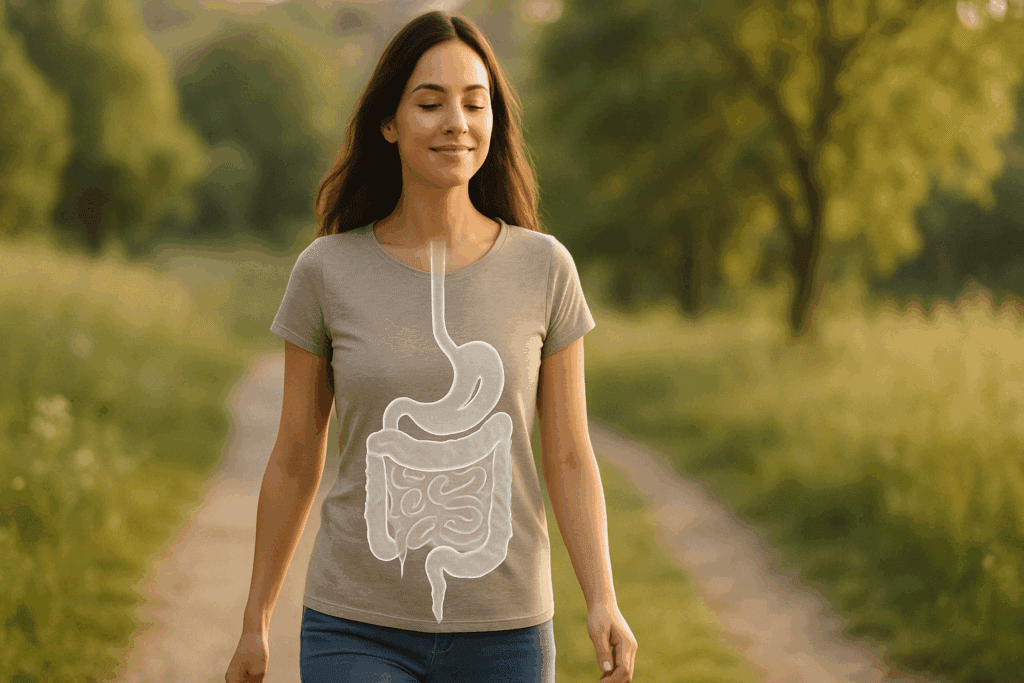
How to Quickly Digest Food Without Upsetting Your System
People often ask how to quickly digest food, especially after a heavy meal. While you can’t override your physiology entirely, there are gentle ways to support faster digestion. Light movement—such as walking for 10 to 15 minutes after eating—stimulates gut motility and can aid in stomach emptying. Staying hydrated before and during meals helps enzymes function efficiently and facilitates smoother transit.
Consuming ginger or peppermint tea can stimulate digestive juices, and probiotic-rich foods like yogurt or kefir can balance gut flora, supporting digestion. Avoid lying down immediately after eating, as it can slow digestion and lead to acid reflux. These strategies won’t necessarily answer “how fast does food digest,” but they can help optimize your natural digestive rhythm without causing distress.
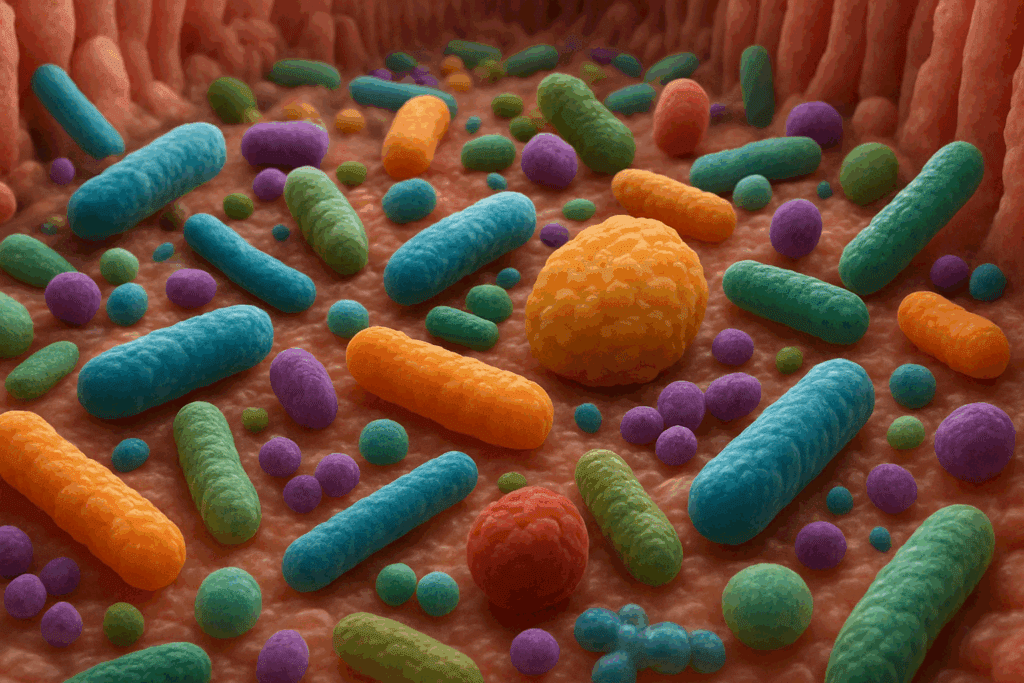
Gut Health and the Speed of Digestion
Gut health plays a central role in determining the speed and efficiency of digestion. A well-balanced gut microbiome aids in breaking down complex carbohydrates and fibers, producing nutrients like vitamin K and B vitamins in the process. When the microbial community is disrupted—due to poor diet, stress, antibiotics, or illness—it can impact how long digestion takes and contribute to symptoms like bloating, cramping, or irregular bowel movements.
Prebiotics, probiotics, and fermented foods can support microbial diversity, thereby influencing how long food stays in your stomach and intestines. A healthy gut also communicates effectively with the brain through the gut-brain axis, modulating appetite, mood, and immune responses. If you’re concerned about how long for food to leave stomach or wondering how long does it take for your stomach to empty, focusing on gut health is one of the most effective long-term strategies.
Frequently Asked Questions: Digestion Speed, Stomach Emptying, and Gut Transit
1. What is the fastest food can run through you, and is it a sign of poor digestion?
The fastest food can run through you is typically within 4 to 6 hours, but this depends on several variables. High-sugar liquids, caffeine, spicy foods, and certain fruits like watermelon or prunes can pass rapidly through your system. While this might seem efficient, it’s not always a good sign. Rapid digestion may indicate malabsorption, food intolerance, or issues like irritable bowel syndrome. If food frequently moves too quickly, your body may not be extracting sufficient nutrients, which could lead to deficiencies over time. Monitoring how fast food digests helps you assess whether your gut health supports proper nutrient assimilation.
2. How long does food stay in your stomach during an average meal?
How long food stays in your stomach varies based on food type and meal size, but the average is between 2 and 5 hours. Fats and proteins stay longer than simple carbs, which often leave the stomach within 90 minutes. However, the question of how long food can remain in the stomach also depends on stress levels, hydration, and how well a person chews their food. Poor chewing delays stomach emptying, as larger food particles require more breakdown. A good rule of thumb is that how long food should stay in your stomach is just long enough for it to mix thoroughly with gastric juices before moving into the small intestine for absorption.
3. How much time does it take to digest food when you combine proteins, fats, and carbohydrates?
When mixed meals include all macronutrients, how much time it takes to digest food typically ranges from 6 to 8 hours. Combining macronutrients, especially fats with proteins, slows digestion as the body needs to release different enzymes sequentially. For example, pepsin breaks down proteins in the stomach while lipase handles fats in the small intestine. This extended digestion can be beneficial for satiety but can also cause discomfort in those with sluggish digestion. Understanding how long to digest a meal can help tailor food choices to your digestive rhythm and energy needs throughout the day.
4. Can food digest in 6 hours, and is that considered normal?
Yes, food can digest in 6 hours, particularly if the meal is light, low in fiber, and carbohydrate-rich. However, this does not necessarily represent the full digestive cycle. While stomach emptying might complete within 2 to 4 hours, full digestion, including nutrient absorption and waste processing, takes longer. When wondering if food can digest in 6 hours, remember that rapid digestion may not always reflect efficiency. It’s important to consider how long does it take for your stomach to empty, as that’s just one stage of a multi-phase process.
5. How long does it take for food to become poop, and what influences this timeline?
The complete transformation of food into waste usually takes 24 to 72 hours. This range answers the common question: how long does it take food to turn into poop? Multiple factors shape this timeline, including hydration, fiber intake, gut microbiome health, and physical activity. People with well-balanced diets and active lifestyles often experience faster gut transit times without compromising nutrient absorption. However, when asking how long does it take to poop out food, be aware that extremely short or long times may indicate underlying digestive issues such as constipation, infections, or malabsorption syndromes.
6. How long does it take to digest a meal when under emotional or psychological stress?
Stress significantly alters how long digestion takes by disrupting the gut-brain axis. During stress, the body shifts into fight-or-flight mode, reducing blood flow to the digestive tract and delaying peristalsis. For some, this slows how long for food to digest, causing bloating and discomfort. For others, it speeds things up, resulting in diarrhea. If you notice inconsistent digestion times, evaluating your stress levels might offer insights into why food seems to either linger too long or pass too quickly through your system.
7. What kind of speed of digestion is ideal for nutrient absorption and gut comfort?
An ideal speed of digestion balances timely nutrient absorption with consistent elimination. If you’re asking how long does it take your body to digest food optimally, aim for a total digestion time of 24 to 48 hours. This includes 2 to 4 hours in the stomach, 4 to 6 hours in the small intestine, and 12 to 36 hours in the colon. How fast food digests is not just about speed—it’s about thoroughness. Slower, steady digestion ensures that proteins, fats, and carbohydrates are broken down properly while preventing gas, bloating, and malnutrition.
8. How to quickly digest food without causing gut irritation or reflux?
If you’re looking for how to quickly digest food in a healthy way, focus on light meals, proper chewing, and moderate movement after eating. Avoid high-fat, spicy, or acidic foods that slow stomach emptying or increase reflux. Walking for 15 to 20 minutes post-meal can help food move along without stressing the digestive tract. Also, avoid tight clothing or lying down immediately after eating, as these habits hinder how long for food to leave stomach efficiently. Herbal teas like chamomile or peppermint may support motility naturally without medication.
9. How long should digestion take in older adults versus younger individuals?
As people age, how long should digestion take tends to increase due to slower metabolism, reduced enzyme production, and changes in gut flora. In older adults, it may take closer to 72 hours for complete digestion compared to 24–48 hours in younger, healthier individuals. This is especially true when considering how long does food remain in the stomach, as age-related changes in gastric acid production can delay the breakdown of food. Medications and chronic conditions may also impact how long does digestion last. For optimal gut function in aging populations, softer foods, smaller meals, and digestive enzyme support may help.
10. How long do you need to digest your food before exercising or sleeping?
The question of how long do you need to digest your food before physical activity or bedtime is vital for comfort and safety. Ideally, wait 2 to 3 hours after a substantial meal before exercising to allow for adequate stomach emptying and prevent cramping. Similarly, going to bed too soon after eating can disrupt how long does it take for your stomach to empty and lead to indigestion or reflux. Light meals may require only 30 to 60 minutes of rest before activity. Paying attention to how much time to digest food before these activities ensures optimal performance and sleep quality.
Conclusion: What the Digestive Timeline Tells Us About Wellness
The simple act of eating initiates a cascade of biological processes that reflect our internal health and external lifestyle. Whether you’re wondering how much time does it take to digest food, how long should digestion take, or how long does it take to poop out food, the answer is rarely one-size-fits-all. Digestion speed is influenced by what we eat, how we live, and the state of our gut microbiome.
From the fast-track transit of fruit smoothies to the prolonged digestion of high-fat meals, understanding what kind of speed of digestion is normal helps us make informed dietary decisions. Paying attention to how long does food remain in the stomach or how long can food remain in the stomach may offer insights into hormonal balance, metabolism, and digestive health. And in the bigger picture, learning how long does it take your body to digest food is less about speed and more about harmony—ensuring that your digestive system is functioning smoothly, efficiently, and in sync with your body’s needs.
By nurturing gut health, choosing balanced meals, staying active, and being mindful of stress, we can support a digestion process that not only extracts nutrients efficiently but also enhances overall well-being. So the next time you wonder how long do you need to digest your food, consider the intricate dance your body performs every time you eat—and give it the care and time it deserves.
Further Reading:
How Long Does Food Stay in Your Stomach?
A review on the food digestion in the digestive tract and the used in vitro models


